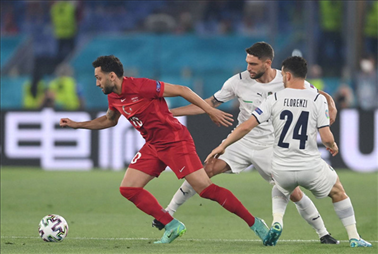The 2024 European Cup qualifiers have come to an end. The 55 European national teams will decide 20 places to directly qualify for the finals at the end of this month, while the remaining 4 places will be selected through the UEFA playoffs in March next year. However, this promotion rule has caused a lot of controversy. Some people think that the European League play off
The 2024 European Cup qualifiers have come to an end. The 55 European national teams will decide 20 places to directly qualify for the finals at the end of this month, while the remaining 4 places will be selected through the UEFA playoffs in March next year. However, this promotion rule has caused a lot of controversy. Some people think that the UEFA playoffs give more opportunities to some weaker teams, while others think that this way is unfair, which is bad for some stronger teams.
The qualification of the League of European Nations play off is determined according to the performance of the League of European Nations. The top team of each level group is eligible to participate. If the team has been promoted through the preliminary contest, the qualification will be extended to other teams of the same level. If there are less than 4 teams in a certain level, the vacant places will be supplemented by teams in level D. The play off will adopt the single defeat elimination system, and the four teams of each grade will carry out the semi-finals and finals, and finally decide one place for promotion.
The advantage of this rule is that it can give some traditional weak teams more opportunities to participate in the European Cup, and it can also stimulate the competitiveness and attractiveness of the League of European Nations. For example, Kosovo, Belarus, Macedonia and Georgia are the top teams in the D-level group of the current European League of Nations. These teams are all new faces of the European Cup. They are expected to make history in the play offs and become the first team to advance from D-level to the European Cup.
However, the disadvantage of this rule is that it may cause some stronger teams to lose the chance to play off because of the defeat of the European League of Nations, and it may also allow some weaker teams to get the chance to play off because of the luck of the European League of Nations. For example, the top teams in the A-level group of the current European League of Nations are the Netherlands, Switzerland, Portugal and England. These teams are regular visitors to the European Cup, and their performance in the qualifiers is also excellent, basically locking in the places for promotion, which means that their play off qualification will be inherited by other teams of the same level. And some of these teams are good teams, such as France, Spain, Italy and Belgium. They are also likely to be qualified through the qualifiers. In this way, the level A play off places will be won by weaker teams, such as Iceland, Bosnia and Herzegovina, Sweden and Wales.

Therefore, the rules for the qualification of the UEFA playoffs are not perfect. It is not only beneficial to some weak teams, but also detrimental to some strong teams. It not only increases the diversity of the European Cup, but also reduces the level of the European Cup. It remains to be seen whether UEFA will adjust this rule.
The following is a table showing the top group names and qualification of the play offs at all levels of the League of European Nations:

| grade |
Team Leader |
Qualification |
Play off qualification |
| A |
Netherlands, Switzerland, Portugal, England |
Basic locking |
Extended to other teams of the same level |
| B |
Ukraine, Sweden, Bosnia and Herzegovina, Denmark |
It is expected to be promoted |
Extended to other teams of the same level |
| C |
Scotland, Finland, Norway, Serbia |
There is competition |
retain |
| D |
Kosovo, Belarus, Macedonia, Georgia |
No hope of promotion |
retain |













